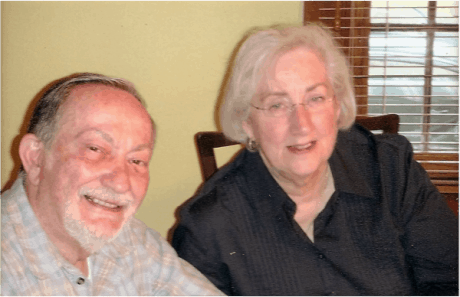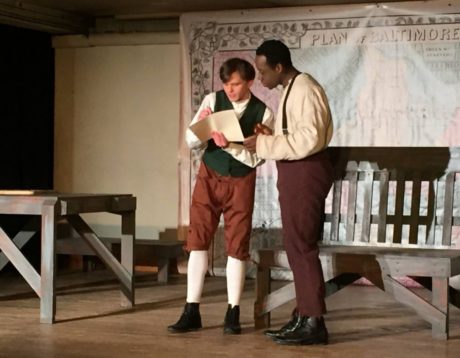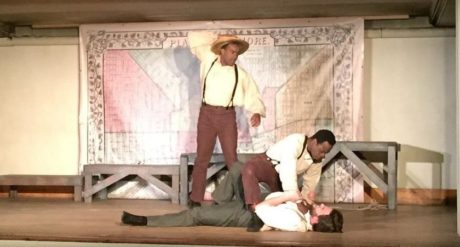In Part Two of his interview with Playwright Walt Vail, Henrik Eger asks Walt to take him on his journey of writing Young Frederick Douglass.
Henrik: How long did it take you to write Young Frederick Douglass?

Walt: I wrote it rather quickly once I decided to use an older DOUGLASS as the narrator and FREDDY, age 17-19, as himself—and to tell the story of FREDDY’S growth and escape from slavery. This story is so exciting that I couldn’t stop writing it.
Take us into your journey of writing this play. What were the most surprising discoveries for you about Frederick Douglass?
The writing in his book Life & Times Of Frederick Douglass [his third autobiography, published in 1881, revised in 1892] is so vivid that I loved it as a writer myself. I felt immediately that no one really knows American History without reading this book. Douglass is a great American hero to all, white and black, etc. Brilliant, a genius who looked around him with great curiosity and asked questions like, “How do whites, who are few, keep blacks, who are many, in bondage?” His answer, “Ignorance.” Therefore, literacy and knowledge became “The direct route from slavery to freedom.” Can anyone not be inspired by that?
How many rewrites of Young Frederick Douglass have you made, and did you do any rewrites for the The Beacon Theatre Productions’ production? If so, tell us about your revision process.
About three drafts gave me the script, as is usual for me. Then I had the script printed. No further changes for Beacon. Between drafts, I had the script read aloud—I need to hear it to make it work.
You said that Joy, your life-mate, reads all your drafts, and gives you feedback on your way of portraying female characters. What recommendations did she make on Young Frederick Douglass that you listened to and adapted?
Joy helped me understand Sophia—why she didn’t understand slavery—and why she instantly loved Freddy, after his story of separation from his grandmother.

Were there any recommendations that she made, which you did not include but wished you would have, or are considering integrating for the next production?
Not yet. I really would like to write the story that is told in the last part of the Douglass autobiography: his return in adulthood to meet with his slavers, the Auld family. They seem to have been proud of him, if a bit reluctantly, but they had changed, too, with the changing world of America.
Are there other historical figures you are interested in for a future play, and why are their stories perfect for the stage?
I’ve already written a play on the survival of Betsy Ross during the British occupation of Philadelphia. I’ve also written the story of Eleanora Duse, and her emancipation from the men who used her. History is rich with great characters.
Abe Lincoln, Jackie Robinson, Abigail Adams—but I need a meaningful story aspect of a character before seeing a play become real in my mind. Some characters’ lives are very complex for a play.
Now that you have seen the production of Young Frederick Douglass, what are the choices of the artistic director that spoke to you the most and why?
I loved the production of Young Frederick Douglass. Georgina Bard, the Artistic Director [of Beacon Theatre Productions] and John Mullany, the director of Young Frederick Douglass put together a wonderful cast and crew who presented the show with enthusiasm and energy. The costuming suggested the period of the play—how Freddy Bailey (Douglass’ original name) and the elder Frederick Douglass as narrator might have appeared in life. I could see that the two excellent actors made it clear that each was playing the same person at different ages—Freddy Bailey as a humble but intelligent young slave—and Frederick Douglass as the great American leader, orator, abolitionist, and brilliant spokesman for his people.
As a playwright, what did you think about the performance of the two actors who are playing Frederick Douglass?
The two actors, Kamili Feelings as Frederick Douglass the older, and Gregory Holmes Jr. as Freddy Bailey did an outstanding job, under the direction of John Mullany, performing their roles. One could see Freddy growing from a humble slave into a powerful, free man as the play progressed. He starts out, head lowered, beginning to find some life and joy with his assignment to young Tommy Auld, learning to put a puzzle together, and learning his ABC’s.
Slowly he stands erect and proud to the point in Act II where he breaks his slave-breaker, Edward Covey, and challenges Covey to ever touch him again. Holmes also shows the courage of Freddy, the young slave, in teaching his fellow slaves to read.
Kamili Feelings is strong as the orator Douglass, showing us much more of what Douglass becomes as his life progresses—a man with eloquence and a deep understanding of what he will accomplish for his people and his country.
The two Fredrick Douglass actors did a good job. There was no problem understanding that Freddy and Frederick were two ages of the same character.
What did you admire about the performances of the other cast members?

Beacon Theatre’s production of Young Frederick Douglass, under Director Mullany, did full justice to the subject and the script, presenting all of the characters in a setting that effectively came to life as only a staged play can do for an audience:
Katie Frazer as Sophia Auld showed a woman from the North (Pennsylvania) coping with the unfamiliar reality of slavery, and being slowly changed by it, but retaining her values. Michael Pliskin as Hugh Auld, Sophia’s husband, a man of the South, trying to bring her to his belief that “Slavery is ordained by God.” Pliskin is also excellent as Thomas Auld, Hugh’s brother, and as Edward Covey, the slave breaker, in Act II. In his three roles, he needs to be forceful and sure of himself as Auld, and then arrogant but defeated (without admitting it) as Covey. Pliskin accomplishes all three roles effectively.
Warren Johns successfully plays four diverse characters, and Damon Zarro does a great job as Tommy Auld—a young boy who grows into Freddy Bailey’s best friend in the Auld family.
Overall, the performance worked for the audience and put the story and its point across. For me, it disappointed a little because it should’ve run 90 minutes, not two hours. It did make clear a fault of the script—I depend too much on narration in Act II—even though the action makes Act II seem more intense than Act I.
What stood out for you in this Beacon Theatre production?
A playwright like myself, with many acting roles behind me, and having seen a thousand productions—I have a performance in my head when I write a play—an ideal performance. Joy complains about this all the time.
Beacon Theatre has a high purpose in this and in all of its productions—to do work that has a point and a lesson for all of us, as well as to be entertaining. They certainly made my play’s point (and Frederick Douglass’ point) that “Literacy is the direct point from slavery to freedom.” This is a message for our time as well as for the past—for if one defines “slavery” broadly, it is clear that literacy and the knowledge that flows from literacy is the way to be free people. As a playwright, I was thrilled to have Douglass’ message made so well by Beacon’s production. My hope is that audiences, young and old, will be inspired.
Is there anything else you would like us to know?
As the playwright, I feel grateful to have had a beautiful production of a script that I spent many hours on, and even more grateful that its message will be delivered to and considered by many audiences in its run through April 24, 2016—perhaps even beyond. Thanks, Beacon Theatre.
https://youtu.be/Fj-gz3u-1jM
Young Frederick Douglass plays through April 24, 2016, at Beacon Theatre Productions (BTP) performing at Olivet Covenant Presbyterian Church Theatre – 608 North 22nd Street, in Philadelphia, PA. For tickets, call the box office at (267) 415-6882, or purchase them online.
Running Time: Two hours, including an intermission.
LINKS:
Playwright Walt Vail on his New Play ‘Young Frederick Douglass’ Which Opens Tomorrow at Beacon Theatre Productions in Philadelphia by Henrik Eger.
Reflections on Playwriting: A personal interview with Walt Vail, one of Philadelphia’s most experienced playwrights by Henrik Eger on Drama Across the Globe and on Phindie;
Sixty Years of Philadelphia Theater: Interview with playwright Walt Vail by Henrik Eger.
Playwright Walt Vail on his New Play ‘Young Frederick Douglass’ Which Opens Tomorrow at Beacon Theatre Productions in Philadelphia by Henrik Eger.
https://www.youtube.com/watch?v=y6SDMbdojlE





